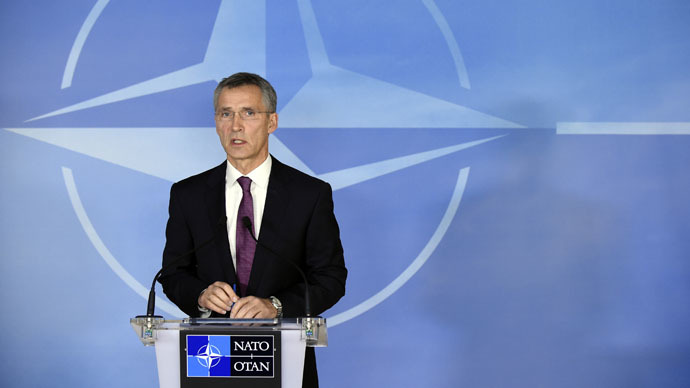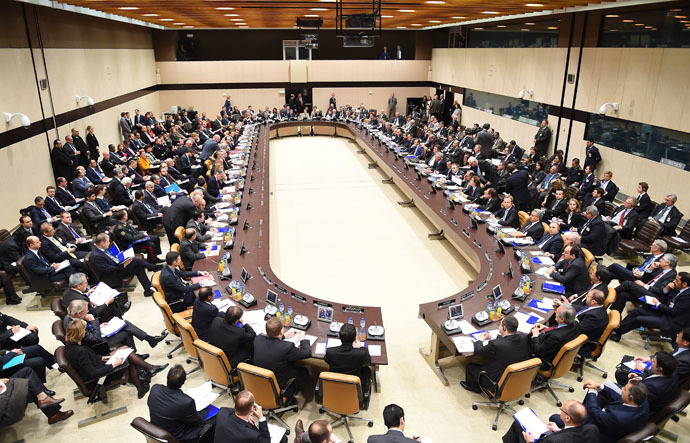‘NATO’s disastrous expansion at the core of the Ukraine conflict’

he principle cause of the Ukraine crisis was the West pressing Kiev to enter the EU Association Agreement and NATO’s extremely disastrous eastwards expansion, Samir Dathi, National Officer of the Stop the War Coalition, told RT.
NATO announced its expansion eastwards in Europe because of the Ukrainian crisis. Secretary-General Jens Stoltenberg said Russia was violating the Ukraine peace agreement signed in Minsk on September 5. He urged Moscow to remove “Russian forces from near the Ukrainian border.” The alliance also approved a quick reaction force and a permanent military presence near Russia.
RT:What do you think is the reason for the timing of this?
Samir Dathi: NATO and the West have been talking about creating a rapid reaction force for months. Back in September in Newport at NATO’s summit meeting, I think it was a first time when they discussed this. I think this is a fairly predictable development. The conflict that NATO is facing in Ukraine is different to what they have been used to for a number of years. Since the end of the Cold War, since 1990, America and NATO have enjoyed a kind of global imperial supremacy. They have been able to go around the world at their own leisure in their own time pulverizing third world countries without much retaliation: Iraq, Afghanistan, Libya and so on, so forth. But now with Ukraine they face a much more significant adversary - Russia. And they don’t have the military means to really deal with this new type of challenge. So they need to reconfigure their military, and to do that they need a rapid reaction force. They need to be able to mobilize thousands of troops at a moment’s notice to meet challenges from Russia, as and when they arrive, perceived challenges.
RT:Stoltenberg says the decision to expand eastwards was a direct response to the Ukrainian crisis. Do you think it will help to resolve the conflict or it is only going to make it worse?
SD: NATO has been expanding eastwards for some time since 1990 and it has been making things a lot worse. The most immediate cause of the conflict in Ukraine was this European deal that the West wanted Yanukovich, the then head of Ukraine, to enter into which would have imposed the whole host of neo-liberal austerity reforms onto Ukraine which would have completely destroyed the lives of the ordinary Ukrainian people. That initially precipitated this conflict. The eastwards expansion of NATO has been absolutely disastrous. And the conflict that we now are seeing is an inexorable consequence of that move eastwards.

‘West gripped by fear of Russian influence in Eastern Ukraine’
Ivan Eland, Defense analyst, thinks that the West “is suspecting that Russia is resupplying and reinforcing the rebels in Eastern Ukraine” and that is why it is “creating this rapid reaction force.”
RT:Why has this announcement come now? What do you make of the timing of it?
Ivan Eland: I think the tensions between Russia and Ukraine are well-known and I think the West is suspecting that Russia is resupplying and reinforcing the rebels in Eastern Ukraine. And that is what is going on here - they are very nervous, so they are upping the air patrols around the Baltics, they are rotating forces to the Baltics and Poland, and they are also creating this rapid reaction force which will take effect in early 2015, and also then will become permanent later on.
RT:The NATO chief said the confrontation with Russia might "get out of control.” What do you think he meant by that?
IE: I think there is some trepidation in the West that the Russians will escalate this into a full-blown invasion of Eastern Ukraine and perhaps even go further into Ukraine. This is a fear in the West and that is what is driving these measures to symbolically say to Russia: “Listen, halt your activities in Eastern Ukraine!”
RT:Stoltenberg also went on to say that the decision to expand eastwards was a direct response to the Ukrainian crisis. In your opinion, will it help to resolve the conflict or could it only make it worse?
IE: Anytime you ratchet things up it definitely makes things worse. I think Ukraine ultimately is going to have to rather than being in one alliance or another it is going to have to be independent, it is going to have devolution of authority to its regions. It can trade both with the EU and Russia. Certainly NATO should not take in Ukraine; it should be an independent country.
RT:What do you think will be Russia’s response to this latest NATO statement?
IE: Unfortunately, there is sort of tit-for-tat type of response. I’m hoping Russia will not escalate it even further. But I don’t know if that will happen or not. This crisis does have a potential “get out of hand,” but I think that there is blame on both sides in this crisis.
The statements, views and opinions expressed in this column are solely those of the author and do not necessarily represent those of RT.
The statements, views and opinions expressed in this column are solely those of the author and do not necessarily represent those of RT.












